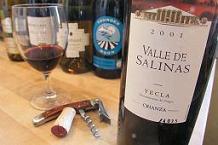In Europe, wine means food...
March 7, 2005
Why you lose weight is explained delightfully in the new bestseller "French Women Don't Get Fat" by Mireille Guiliano. Apparently, it's a combination of joie de vivre, metabolic pseudo-science, and at least one woman's desire to wear cute outfits.
Why you don't get drunk is easier to explain, although a little more cut and dried. At lunch and at weekday dinners, Europeans do drink wine, but they tend to drink a "house" wine that's cheap and light and literally lower in alcohol by a couple of percent.
A typical "fine" white wine will have an alcohol level anywhere from 11% to 13%. Even though a house wine's 8% level is only three percentage points less than normal, it's 27% less alcohol, which means 27% less intoxication.
Everywhere in Europe, wine is served with and as food, and this has a diluting effect as well. If you're six-two and 170 pounds like me, it's possible to toss back a couple of glasses of wine in the course of a lunch and barely feel it.
At the end of the trip, the collective memory you're left with is of drinking wine day and night yet never feeling drunk. The reality is you were slightly less than three-quarters intoxicated all the time and hardly knew it.
Spanish Wine Armada
 2001 Valle de Salinas Yecla (about $11, imported by Langdon Shiverick, 216-861-6800)
2001 Valle de Salinas Yecla (about $11, imported by Langdon Shiverick, 216-861-6800)If you look at a map of Europe, you see that southern France and southeast Spain form a giant south-facing arc that opens on to the Mediterranean. Wine culture along this arc is relatively continuous, regardless of the political boundaries.
Delicious grenache and mourvedre from the south of France keep growing beautifully even as the names change to garnacha and monastrell in Spain. Thanks to decades of bad post-World War politics, international trade in Spanish wine has been weak for a long time. We are just now getting a lot of great Spanish whites and reds from more places than Rioja. Superb wine regions like Valdepenas, Jumilla, and Yecla will one day be as familiar.
This Valle de Salinas is a wonderfully rich red blend of monastrell (the French call this grape mourvedre), cabernet sauvignon, and syrah. These are about the three biggest, most intensely flavorful red grapes on the planet, and the blending captures the best parts of each: monastrell is typically dark and brooding, syrah is full of smoke and roasting meat, and the big tannin of the cabernet contributes an almost architectural structure.
Overall, the herbal spiciness is the most obvious and immediately pleasing part of this wine. It smells like a wild blend of rosemary, dill and sage. There's no scientific evidence to support this, but the lot/bottle number on the lower right-hand corner of the label makes me think this wine would sell for more money, if it could. At only $2 a glass, it's a bargain as it is.
Grilling season is fast approaching here in the northern hemisphere, and this spicy red is sure to work its way into the lineup. Valle de Salinas is perfect for grilled vegetables and barbecued meat and meaty fish of almost any kind. I love how the oak in the wine moderates hot and spicy dishes like peppery Italian arabiatta sauce or garlicky sauteed shrimp.
Trading Insults
Wine is not traditionally the first casualty of war, but in the case of the ongoing U.S./Canada trade dispute over lumber, it could be.
According to a Canadian Press report, British Columbia forest minister Mike de Jong is "strongly considering" putting a stop to U.S. wine imports which in 2004 totaled almost $125 million to all of Canada. In comparison, the Canadian lumber exports in question total $10 billion annually, or about a third of the U.S. market.
In the Canadian language, "strongly considering" translates as "we are going to war." When de Jong went on to say, "The ongoing lack of attention to this matter is troubling," we can only imagine the passion and vehemence behind his emotional outburst.
NAFTA and the World Trade Organization are generally behind Canada on the lumber issue, but the U.S. has already collected $4 billion in duties it's never going to give back no matter how much U.S. wine the Canadians don't drink.
© 1988-2025 by Jonathon Alsop
336 Washington St. Brookline MA 02445-6850 617-784-7150
jalsop@invinoveritas.com
Guarantee of Privacy Copyright Reminder